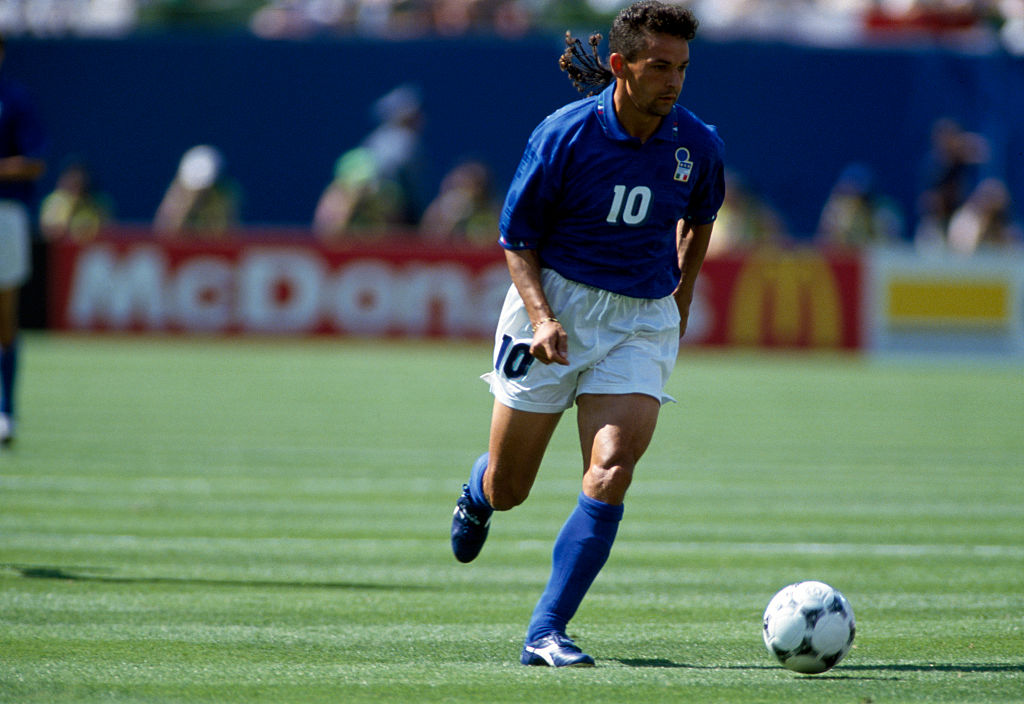(Photo above by Pixabay / Pexels)
Baggio: The Divine Ponytail is a new Netflix biopic on one of Italy’s most talented and beloved soccer stars, Roberto Baggio. Just as the film shows the evolution of Baggio’s famous ponytail from the full glory of its late ’80s prime to the confident curls of the early aughts, it also shows Baggio’s evolution as a human being. He transforms from an anxious, pessimistic young man into someone who perseveres over the harshest trials, all fueled by his sincere Buddhist practice.

Roberto Baggio (Italy) in action during a first round match of the 1994 FIFA World Cup against Norway. Italy won 1-0. (Photo by Jerome Prevost/TempSport/Corbis/VCG via Getty Images)
Here are three lessons we learned on Buddhism from Roberto Baggio.
1. What it really means to win.
Baggio is perhaps most famously remembered for missing a penalty kick in the 1994 FIFA World Cup Final against Brazil, which cost Italy the cup. For Buddhists however, winning is not just about holding a trophy in front of thousands of people, it’s about winning over yourself. Through chanting Nam-myoho-renge-kyo, Baggio found the courage and strength to move forward from this setback.
Though he faces more injuries and is ultimately snubbed from the 2002 FIFA Italy World Cup squad, he never gives in to setbacks and, as a result, becomes Italy’s most beloved soccer player.
The Buddhist philosopher Daisaku Ikeda writes:
Why doesn’t constant trampling defeat the dandelion? The key to its strength is its long and sturdy root, which extends deep into the earth. The same principle applies to people. The true victors in life are those who, enduring repeated challenges and setbacks, have sent the roots of their being to such a depth that nothing can shake them.
Baggio wins the battles in life that count. He transforms his difficult relationship with his father and inspires others with his undefeated spirt. In fact, his biggest mistake becomes his tool for encouraging many people around the world. This is what winning really looks like for Buddhists.
In fact, his biggest mistake becomes his tool for encouraging many people around the world. This is what winning really looks like for Buddhists.
2. Having a mentor is everything.
When Baggio faces his most devastating injury in the lead-up to the 2002 World Cup, he wonders aloud if he should just give up. That’s when his close friend confronts him by saying, “Is that what you would tell Maestro (teacher) Ikeda?” To Baggio, Maestro Ikeda is someone who is living out the bodhisattva vow to inspire all people to become happy and strong. Thinking about his mentor’s spirit to be selfless and courageous, Baggio knows he can’t back down. He pushes on and achieves the greatest comeback of his career.
Having a mentor is everything. The example of a great teacher makes us look at ourselves and see how we can evolve and improve without end.
3. Just give it a try.
Baggio is introduced to Buddhism by an earnest record store clerk who encourages him just to give it a try. All that Baggio commits to is having an open mind. The clerk explains to him that Buddhism is not magic, but a philosophy that helps us bring out our best selves. He says: “The important thing to remember is, everything is up to you. If you don’t work hard, things won’t happen.”
What’s the most important thing to keep in mind as you start your Buddhist practice? To just try chanting Nam-myoho-renge-kyo as often as you can. It also helps to have a supportive community around you to encourage you along the way. It’s really that simple.
Though Baggio missed the fateful penalty kick in the 1994 World Cup, he proves with his Buddhist practice that it’s how you bounce back that makes you a champion.
